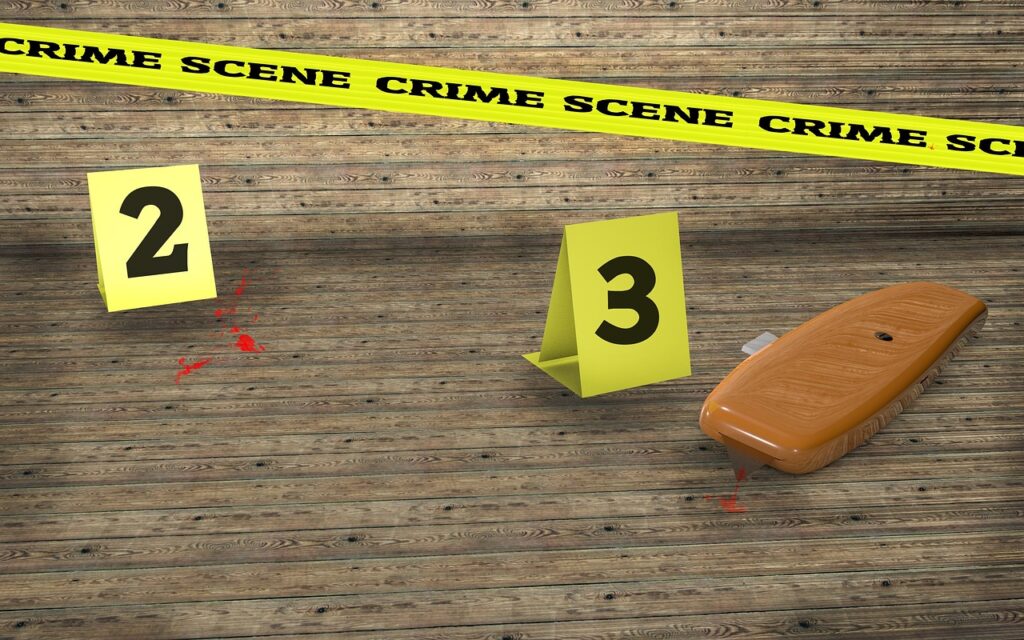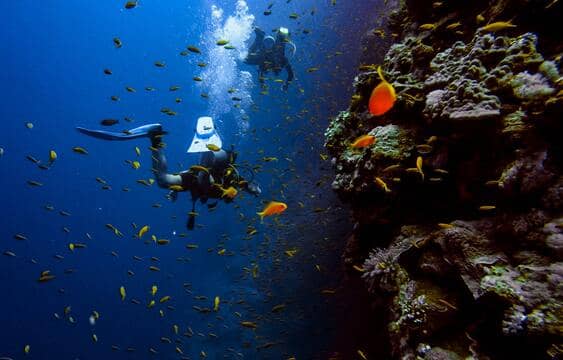Forensic science plays a critical role in solving crimes by providing crucial evidence that helps convict criminals and exonerate the innocent. Its interdisciplinary nature combines various scientific techniques to analyze physical evidence from crime scenes. With advancements in technology and an increasing reliance on scientific methods for investigations, the demand for skilled forensic science professionals is on the rise, offering diverse career opportunities within the forensic science field.
This guide explores various forensic science careers, required education, skills, and tips for success, catering to adult learners and non-traditional students seeking a rewarding career in this field.
Online Forensic Science Programs

Forensic Science Programs from GCU
BS in Forensic Science; MS in Forensic Science

Forensic Science Programs from National University
MS in Forensic Science; Graduate Certificate in Forensic and Crime Scene Investigations

Forensic Science Programs from Oklahoma State
MS in Forensic Science Online
What is Forensic Science?
Forensic science is a multidisciplinary field that combines various scientific techniques to analyze and interpret physical evidence in criminal investigations. This branch of science plays a crucial role in the criminal justice system, aiding in solving crimes and securing justice for victims. In this section, we will explore the scope of forensic science and its various specializations, as well as the differences between a forensic scientist and a crime scene investigator.
Definition and Scope of Forensic Science
Forensic science encompasses a wide range of scientific disciplines, such as biology, chemistry, physics, and psychology, applied to the examination of crime scenes and evidence. Forensic scientists collect, analyze, and interpret evidence to reconstruct events, establish links between suspects and crime scenes, and provide expert testimony in courts. The scope of forensic science is vast, and professionals in this field can work in diverse settings such as crime laboratories, law enforcement agencies, medical examiner offices, and academic institutions.

Forensic Science Programs from Regent University
BS in Cyber Digital Forensics
Forensic Science Jobs and Their Roles
Forensic science offers a variety of exciting career paths for individuals interested in the field. These professionals play a crucial role in solving crimes and ensuring justice. In this section, we will explore some of the most prominent forensic science jobs and their roles, discuss opportunities for career advancement and professional development, and look at the job market outlook and salary expectations for these careers.
Here is a list of some popular forensic science jobs and the responsibilities associated with each role:
Arson Investigator
Arson Investigators are specialized detectives who investigate the causes of fires to determine whether they were accidental or intentional. They collect evidence at the scene, interview witnesses, and work closely with law enforcement to identify potential suspects. They may also testify in court as expert witnesses.
Education Requirements
- High School Diploma/GED: Minimum requirement.
- Associate’s Degree: Often in fire science, criminal justice, or a related field.
- Bachelor’s Degree: Preferred by many employers. Subjects related to this career include fire science, forensic science, or criminal justice.
- Certifications: Certifications such as Certified Fire Investigator (CFI) or Certified Fire and Explosion Investigator (CFEI) are often required.
- Experience: Many arson investigators have experience as firefighters or law enforcement officers before transitioning into this role.
Certified Fraud Examiner
Certified Fraud Examiners are professionals who specialize in detecting, preventing, and investigating fraud. They work in various sectors, including finance, insurance, and government, conducting investigations and audits to uncover fraudulent activities.
Education Requirements
- Bachelor’s Degree: Required in accounting, finance, business administration, or a related field.
- Certifications: Must obtain the Certified Fraud Examiner (CFE) credential, which requires passing an exam administered by the Association of Certified Fraud Examiners (ACFE).
- Experience: At least two years of experience in a related field such as accounting, auditing, or law enforcement is typically required.
Computer Forensics Examiner
Computer Forensics Examiners are experts in recovering and analyzing data from computers and digital devices to investigate cybercrimes. They work closely with law enforcement and legal teams to gather digital evidence that can be used in court cases.
Education Requirements
- Bachelor’s Degree: Typically required in computer science, information technology, or cybersecurity.
- Certifications: Relevant certifications such as Certified Computer Forensics Examiner (CCFE) or Certified Information Systems Security Professional (CISSP) are highly valued.
- Experience: Practical experience in IT, cybersecurity, or law enforcement is often required.
Crime Scene Investigator
Crime Scene Investigators, also known as forensic science technicians, are responsible for collecting and analyzing physical evidence from crime scenes. They document the scene, gather fingerprints, DNA, and other evidence, and work with forensic experts to solve crimes.
Education Requirements
- Bachelor’s Degree: Typically required. Subjects related to this career include forensic science, criminal justice, or a related field.
- Training: On-the-job training and field experience are crucial for this role.
- Certifications: Some may pursue certifications such as the Certified Crime Scene Investigator (CCSI) credential.
Forensic Accountant
Forensic accountants investigate financial crimes such as embezzlement, fraud, and money laundering. They analyze financial records, prepare reports, and may testify in court as expert witnesses.
Education Requirements
- Bachelor’s Degree: Required in accounting, finance, or a related field.
- Certifications: Certified Public Accountant (CPA) credential is usually required, along with Certified Fraud Examiner (CFE) or Certified Forensic Accountant (Cr.FA) certifications.
- Experience: Experience in accounting, auditing, or law enforcement is typically required.
Forensic Investigator
A forensic investigator collects, analyzes, and interprets physical evidence from crime scenes to assist in criminal investigations. Their work includes examining fingerprints, DNA, blood samples, and other materials, as well as reconstructing events to provide crucial insights for law enforcement and legal proceedings. They often collaborate with detectives, lawyers, and forensic scientists to solve cases.
Educational Requirements
Education requirements typically include a bachelor’s degree in forensic science, criminal justice, or a related field. Some roles may require advanced degrees or specialized certifications in areas like forensic biology, toxicology, or digital forensics.
Forensic Anthropologist
Forensic Anthropologists apply their knowledge of human skeletal anatomy to identify human remains, often in criminal investigations. They help determine the age, sex, ancestry, and cause of death of the deceased.
Education Requirements
- Bachelor’s Degree: Required in anthropology, biology, or a related field.
- Master’s Degree: Typically required for most positions, with a focus on physical or forensic anthropology.
- Doctorate (Ph.D.): Often required for advanced positions or academic roles.
- Experience: Extensive experience in anthropology and working with human remains is necessary.
Forensic Toxicologist
Forensic Toxicologists analyze bodily fluids and tissues to detect the presence of drugs, alcohol, poisons, and other substances. Their findings are crucial in criminal investigations, particularly in cases of overdose, poisoning, and DUI.
Education Requirements
- Bachelor’s Degree: Required in chemistry, biology, toxicology, or a related field.
- Master’s Degree: Often preferred or required for advancement.
- Certifications: Certifications from the American Board of Forensic Toxicology (ABFT) can enhance job prospects.
- Experience: Laboratory experience is highly valued, especially in analytical chemistry or toxicology.
Forensic Psychiatrist
Forensic Psychiatrists are medical doctors who specialize in the intersection of mental health and the law. They assess the mental state of individuals involved in legal cases, provide expert testimony in court, and may work in correctional facilities or hospitals.
Education Requirements
- Medical Degree (MD or DO): Required, with a focus on psychiatry.
- Residency: Completion of a residency in psychiatry.
- Fellowship: Additional fellowship training in forensic psychiatry.
- Board Certification: Board certification in psychiatry and forensic psychiatry is typically required.
- Experience: Extensive clinical experience is necessary.
Forensic Psychologist
Forensic Psychologists apply psychological principles to legal matters. They assess individuals involved in criminal or civil cases, provide therapy to crime victims, and often serve as expert witnesses in court.
Education Requirements
- Bachelor’s Degree: Required in psychology or a related field.
- Master’s Degree: May be sufficient for some positions, but a doctoral degree is often preferred.
- Doctorate (Ph.D. or Psy.D.): Typically required for most positions.
- Licensure: State licensure is required to practice as a psychologist.
- Experience: Clinical experience, often gained through internships and supervised practice, is essential.
Disclaimer:
The educational requirements and career pathways for these professions may vary based on location, employer, and specific job roles. It is important to research specific requirements for your region and consult with educational institutions or professional organizations for the most accurate and up-to-date information.

Forensic Science Programs from FIU
BS in Crime Scene
Forensic Science Specializations
Forensic science offers a variety of career paths, each with its unique focus and expertise. Some of the notable specializations include:
Ballistics and Firearms
Experts in this field study the characteristics and behavior of firearms, ammunition, and related evidence to help determine the type of weapon used in a crime and potentially trace it back to its owner.
Arson and Explosives
These specialists investigate incidents involving fires and explosions to determine their causes, identify potential suspects, and prevent future occurrences.
Fingerprint Analysis
Fingerprint analysts examine prints found at crime scenes to match them with known individuals or add them to databases for future reference.
Trace Evidence
Trace evidence analysts examine small pieces of physical evidence, such as fibers, hairs, and paint chips, to establish connections between people, objects, and locations related to a crime.
Accident Reconstruction
This specialization focuses on analyzing vehicle accidents to determine their causes, contributing factors, and potential liabilities.
Bloodstain Pattern Analysis
Bloodstain pattern analysts study the size, shape, and distribution of bloodstains at a crime scene to help reconstruct the sequence of events and the nature of the incident.
DNA Analysis
DNA analysts extract and analyze genetic material from biological samples, such as blood, saliva, and hair, to identify individuals and establish relationships between suspects, victims, and crime scenes.
Forensic Odontology
Forensic odontologists apply their knowledge of dentistry to identify human remains, analyze bite marks, and evaluate dental injuries in cases of abuse or assault.
Forensic Anthropology
Forensic anthropologists study human skeletal remains to determine the identity, age, sex, ancestry, and cause of death of deceased individuals.
Forensic Entomology
This specialization involves the study of insects and their development to estimate the time of death and other environmental factors related to a crime scene.

Forensic Science Programs from SNHU
Forensic Psychology Degree Online BA
Forensic Scientist vs Crime Scene Investigator
While both forensic scientists and crime scene investigators (CSIs) play vital roles in criminal investigations, their responsibilities and areas of expertise differ significantly. Forensic scientists typically work in laboratories, where they analyze and interpret evidence collected from crime scenes. They use scientific techniques and instruments to examine physical and biological materials, such as blood, fibers, and fingerprints, and provide their findings in written reports or expert testimonies in courts.
On the other hand, CSIs are responsible for the on-site documentation, collection, and preservation of evidence at crime scenes. They take photographs, make sketches, and gather physical evidence, such as weapons, clothing, and biological samples, for further analysis by forensic scientists. CSIs may also attend autopsies, interview witnesses, and collaborate with other law enforcement officers and forensic experts to solve cases.
How to Get into Forensic Science
Forensic science is a multidisciplinary field that plays a critical role in the criminal justice system by applying scientific principles to solve crimes. Whether you’re interested in working in a lab analyzing evidence, at crime scenes collecting data, or in courtrooms providing expert testimony, entering the field of forensic science requires a combination of education, training, and skills. Here’s a step-by-step guide on how to start a career in forensic science.
Earn a Relevant Degree
- High School Diploma/GED: Start by excelling in science courses such as biology, chemistry, and physics. Math and computer science skills are also valuable.
- Bachelor’s Degree: Most forensic science careers require at least a bachelor’s degree. Recommended degrees might include forensic science, psychology, chemistry, biology, or a related field. Some colleges offer specialized forensic science programs that provide a solid foundation in both science and criminal justice.
- Master’s Degree (Optional): While not always required, a master’s degree in forensic science or a related discipline can enhance your job prospects and open doors to advanced roles, such as forensic toxicologist or forensic anthropologist.
- Doctorate (Optional): For those interested in academic or high-level research roles, a Ph.D. in forensic science or a specialized field such as forensic anthropology or forensic psychology may be necessary.

Forensic Science Programs from NJIT
BS in Forensic Science
Gain Practical Experience
- Internships: Participate in internships or volunteer opportunities with crime labs, medical examiner’s offices, or law enforcement agencies. This hands-on experience is invaluable and can help you build connections in the field.
- Laboratory Experience: Gain experience working in a laboratory setting, whether through your academic program, internships, or entry-level jobs. Familiarity with lab techniques and equipment is crucial for many forensic science roles.
Specialize Your Skills
- Choose a Specialization: Forensic science encompasses various specialties, including forensic toxicology, forensic anthropology, forensic psychology, and more. Decide which area interests you the most and focus on developing expertise in that niche.
- Advanced Training: Depending on your chosen specialization, you may need additional training or certification. For example, forensic pathologists require medical degrees and specialized training in pathology.
Obtain Certification (If Applicable)
- Professional Certification: Some forensic science roles require or benefit from professional certification. For example, the American Board of Criminalistics (ABC) offers certification for forensic scientists, while the American Board of Forensic Toxicology (ABFT) certifies forensic toxicologists.
- Continuous Education: Stay updated on the latest advancements in forensic science by attending workshops, conferences, and courses. Continuing education is often necessary to maintain certifications.
Apply for Jobs
- Entry-Level Positions: Start by applying for entry-level positions such as forensic science technician, crime lab analyst, or crime scene investigator. These roles provide valuable experience and can lead to more specialized or advanced positions over time.
- Network: Join professional organizations such as the American Academy of Forensic Sciences (AAFS) or the International Association for Identification (IAI). Networking with professionals in the field can help you learn about job openings and career advancement opportunities.
Consider Graduate Education (Optional)
- Master’s or Doctorate: If you’re looking to advance in the field or specialize further, consider pursuing graduate education. Advanced degrees can qualify you for leadership roles, research positions, or teaching opportunities in academia.
Build a Strong Portfolio
- Document Your Work: Keep a record of your lab work, case studies, research projects, and any forensic reports you’ve contributed to. A strong portfolio can be a significant asset when applying for jobs or promotions.
Stay Ethical and Objective
- Maintain Integrity: Forensic scientists must adhere to strict ethical standards. The accuracy and objectivity of your work can have serious implications in legal cases, so it’s essential to uphold the highest standards of professional conduct.
By following these steps, you can build a successful career in forensic science, contributing to the pursuit of justice through scientific investigation.

Skills in Forensic Science
1. Technical skills: Forensic scientists require a strong foundation in various technical skills, such as laboratory techniques, instrumentation, and data analysis.
2. Analytical skills: The ability to critically examine and interpret evidence is crucial for forensic scientists. This involves identifying patterns, drawing conclusions, and making connections between different pieces of information.
3. Communication skills: Effective communication is essential in forensic science, as professionals need to present their findings clearly and concisely to colleagues, law enforcement, and legal professionals.
4. Attention to detail: Forensic scientists must be meticulous in their work, as even the smallest detail can be crucial to solving a case.
5. Critical thinking and problem-solving skills: Forensic science professionals need to think critically and creatively to solve complex cases, often using limited or incomplete information.
A successful career in forensic science requires a combination of education, experience, and skills development. As the field continues to grow, there are ample opportunities for individuals to pursue rewarding careers that contribute to the greater good of society.

Tips for a Successful Career in Forensic Science
If you’re looking to be successful in the forensic science field, you should be proactive in developing your career. There are several strategies that can help you stand out and excel in your profession. Let’s explore some of these key tips for a successful career in forensic science.
Networking and Joining Professional Organizations
Building a strong professional network is essential for career growth in forensic science. Networking can help individuals stay updated on industry news, learn about job opportunities, and develop lasting professional relationships. One effective way to expand your network is by joining professional organizations like the American Academy of Forensic Science or the International Association for Identification. These organizations can provide valuable resources, training opportunities, and networking events for their members.
Staying Updated with Forensic Science Industry Trends
The field of forensic science is continuously evolving, with new technologies and methods being developed regularly. To stay competitive in the job market, it’s crucial for professionals to stay up-to-date with these advancements. Regularly reading industry publications, attending conferences and workshops, and participating in online forums can help individuals stay informed about the latest trends and technologies in forensic science.
Continuous Learning and Skill Development in Forensic Science
A successful career in forensic science requires continuous learning and skill development. As the field advances, professionals must be prepared to adapt and expand their knowledge base. Pursuing relevant certifications, attending training sessions, and seeking out additional educational opportunities can help individuals stay ahead in their careers. Additionally, fostering a mindset of curiosity and a commitment to lifelong learning can significantly contribute to career success in forensic science. Remember, the key to a successful career in forensic science lies in staying informed, connected, and committed to continuous learning.
Takeaways
Throughout this guide, we’ve explored the exciting field of forensic science, the different specializations within the field, and the necessary steps to launch a rewarding career in this domain. With numerous job opportunities and the chance to contribute to the greater good, pursuing a career in forensic science can be a fulfilling choice.
Take your next step toward a successful forensic science career by exploring the wide range of subjects and degree programs available at Pathways2Advancement’s online college and program guide. Discover the flexibility and convenience of online education, tailored to meet the needs of adult learners and non-traditional students. Your future is just a click away!

Frequently Asked Questions (FAQs)
In this section, we address some common questions related to forensic science careers to help you better understand the field and its requirements.
What are the biggest surprises for students when they enter the forensic science program?
Students often enter forensic science programs with misconceptions based on popular TV shows and movies. They may be surprised to learn that real-life forensic science work involves more methodical and time-consuming processes than depicted in fictional portrayals. Additionally, students may find that the field requires a strong foundation in science, mathematics, and critical thinking skills, as well as attention to detail and excellent communication abilities.
Are there any particular traits or characteristics that make a student well-suited for forensic science studies?
Successful forensic science students typically possess a strong aptitude for science and mathematics, as well as an innate curiosity and passion for problem-solving. They should also have excellent attention to detail, strong analytical skills, and the ability to communicate complex information effectively. A high level of integrity and ethical standards is also essential, as forensic scientists play a crucial role in the criminal justice system.
What is the difference between a forensic scientist and a crime scene investigator?
While both forensic scientists and crime scene investigators contribute to the investigation of crimes, their roles differ significantly. Forensic scientists primarily work in laboratories, analyzing evidence collected from crime scenes, such as DNA, fingerprints, and trace materials. They use advanced scientific techniques and equipment to identify and interpret evidence, and their findings often play a critical role in legal proceedings. On the other hand, crime scene investigators are responsible for processing crime scenes, documenting evidence, and preserving the integrity of the scene for further analysis. They may also collaborate with forensic scientists to interpret findings and reconstruct events.
How important is it to have a specialized degree in forensic science?
Having a specialized degree in forensic science can be advantageous for those seeking careers in the field. A degree program tailored to forensic science will provide students with the necessary scientific background, practical skills, and understanding of the criminal justice system required for success in the field. However, it is not always mandatory, as many professionals enter the field with degrees in related disciplines, such as chemistry, biology, or criminal justice. Pursuing additional certifications, practical experience, and continuous professional development can also help individuals with non-specialized degrees succeed in forensic science careers.

